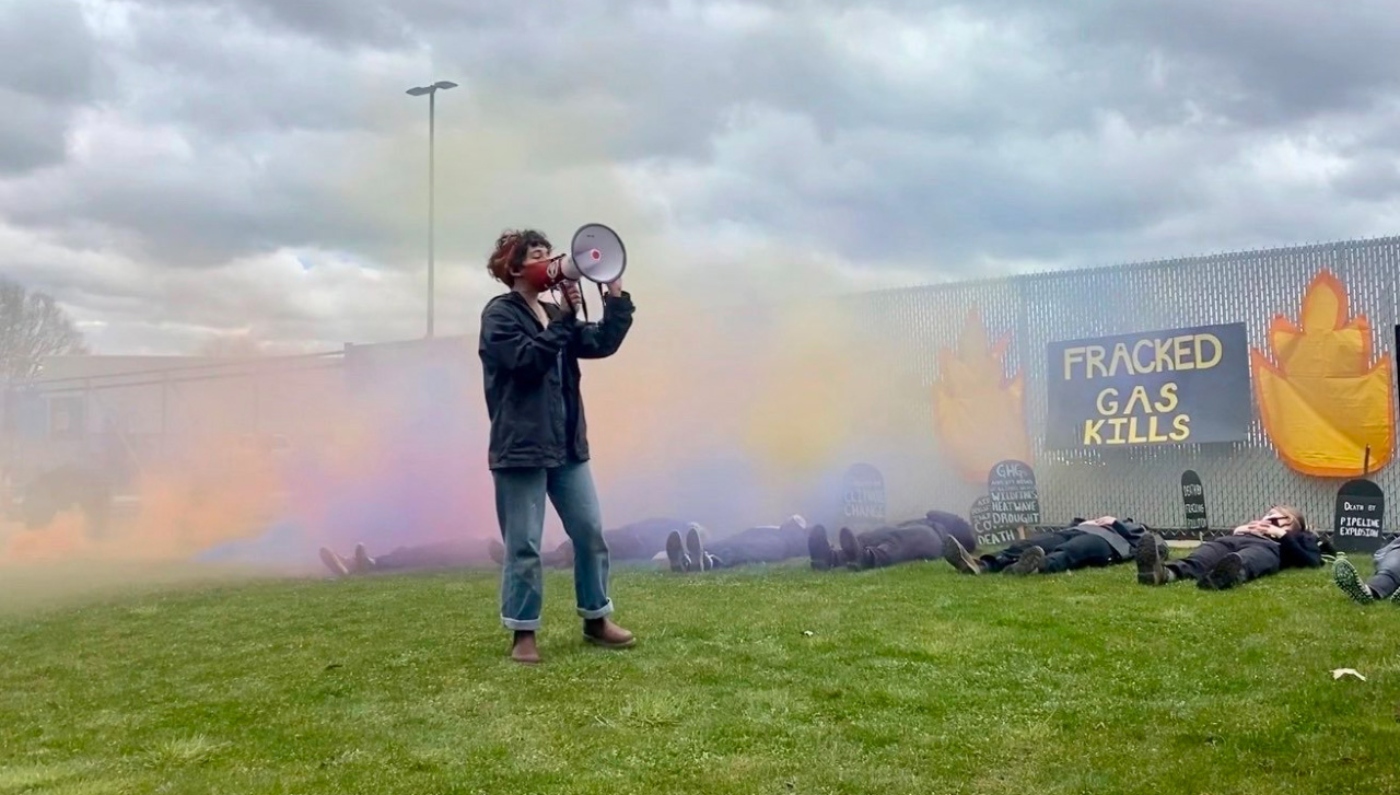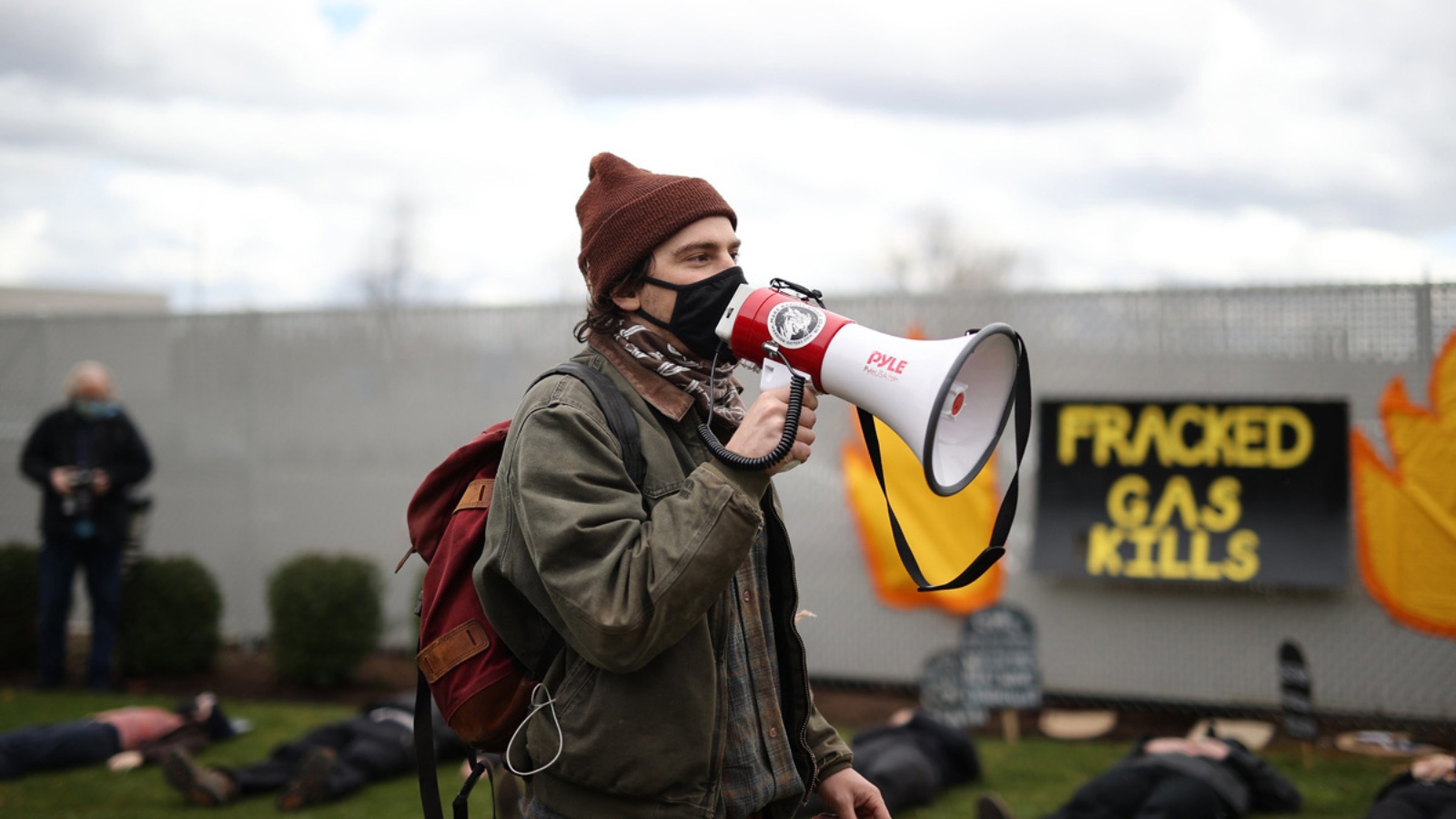This story was originally published by High Country News and is reproduced here as part of the Climate Desk collaboration.
Tyee Williams has been on the frontlines of climate change as a wildland firefighter. He helped battle the Pine Gulch Fire, one of three record-setting fires in Colorado last summer and fall — all scorching examples of how the climate crisis is intensifying wildfires in the Western U.S.
Back home in Eugene, Oregon, Williams is on another vanguard of the climate fight: a push for the city to cut fossil fuel consumption. That work includes pressing the Eugene City Council to revamp its operating agreement with the local gas utility, Northwest Natural, to reduce greenhouse gas emissions.
In testimony before the city council in February, Williams shared his experience, which included digging a fire line to protect natural gas infrastructure. “On one side I could see the glow of the wildfire, and on the other hillside I could see flares from the gas wellheads from fracked gas,” Williams said during a virtual public meeting. To him, the connection between fossil fuel emissions and worsening wildfires is clear. “As someone who will have jobs created by Northwest Natural, I would like to say, I’m not appreciative of it.”
The current operating agreement with Northwest Natural is set to expire in May. Renegotiations, however, are stalled, in part because the city is pushing to include funding for its ambitious climate plans in the contract. Natural gas accounts for about 40 percent of fossil fuel use in the city, so the city sees reducing gas burning as a key to reaching climate commitments. By tying climate action funding to the gas company’s operating agreement, the city is testing a new tool for municipalities across the Western U.S. looking to phase out fossil fuels.
The contract dispute between Eugene and Northwest Natural is over the utility’s franchise agreement, which grants it the ability to bypass certain bureaucratic hurdles: for example, filing a permit or getting an inspection every time it installs a new hookup. The expiration of the agreement doesn’t mean gas customers will suddenly have their gas shutoff. But it would mean the gas company will face more red tape, and Eugene will miss out on the approximately $1.4 million the gas company pays each year under the agreement.
One of the main sticking points in the negotiations, which started in 2019, is a carbon fee program proposed by the city. It would add at least $740,000 per year to existing franchise fees charged to Northwest Natural, and would primarily fund residential energy efficiency programs. It would also pay for carbon offsets and investments in renewable natural gas — gas from non-fossil fuel sources like landfills and feedlots. Eugene asserted that the fund is a condition of any new contract, while Northwest Natural argued that the fund should be separate from the franchise agreement.
Climate and environmental justice advocates see the negotiations as part of a just transition away from fossil fuels. “We can’t just say we don’t want natural gas,” said Aimee Okotie-Oyekan, the environmental and climate justice coordinator for the Eugene-Springfield chapter of the NAACP. “We need to be building the alternative.” The carbon fee program would pay for home improvements like insulation, which reduces energy consumption and lowers bills.

Throughout the ongoing contract disputes, Northwest Natural has maintained its infrastructure can be part of climate solutions, particularly with renewable natural gas. “No matter the outcome of discussions with the City of Eugene, we are moving forward with our vision of a carbon-neutral pipeline by 2050,” Kim Heiting, Northwest Natural’s senior vice president of operations, wrote in an email.
But Eugene isn’t content waiting for an uncertain future of cleaner gas. In 2014, the city passed an ordinance to reduce fossil fuel use to 50 percent of 2010 levels by 2030. Despite overall emissions reductions in recent years, natural gas emissions in the city continue to grow. Not reaching an agreement with Northwest Natural could lead to protracted court fights, increased energy bills for customers, and more work for city staff as they deal with an influx of permits, but Eugene Mayor Lucy Vinis said that isn’t what she worries about most. “My biggest concern is that we’re facing a climate crisis,” she said.
Standing firm against the gas company is about climate leadership, Vinis added. “That’s why we want to succeed — this is an important pathway, and we’d hope other cities would follow.” Policy experts see Eugene leading the way for other municipalities, like King County, where Seattle is located, by providing an example of how to leverage franchise agreements as a tool for climate action, said Eric de Place, the director of the nonprofit Sightline Instititute’s Thin Green Line program, which fights fossil fuel infrastructure expansion in the Northwest. Making gas companies pay for climate resilience as a condition of franchise agreements “is a superpower when it comes to decarbonization,” he said. “It changes the nature of the conversation dramatically.”



